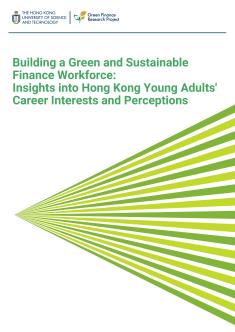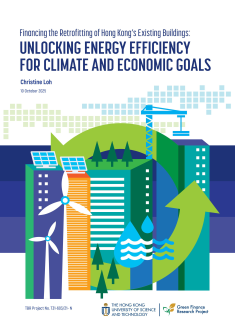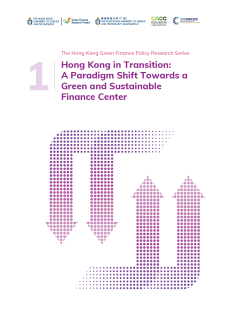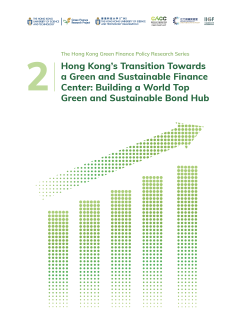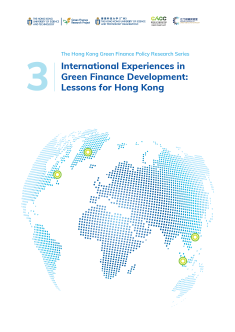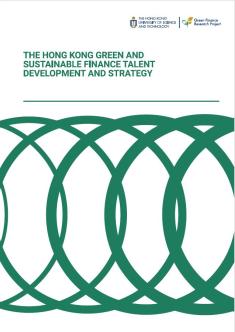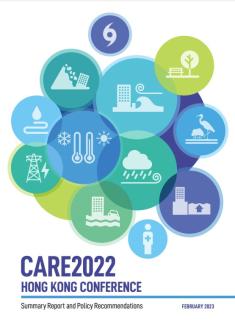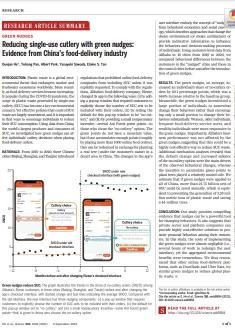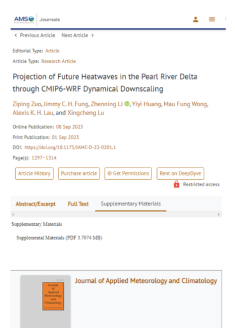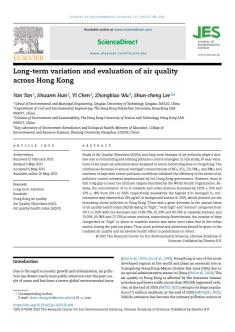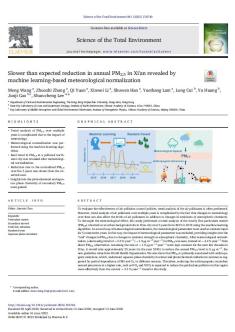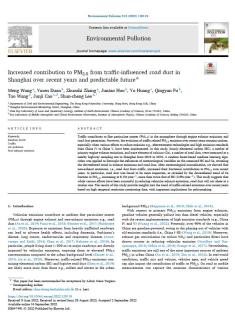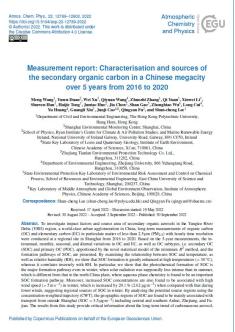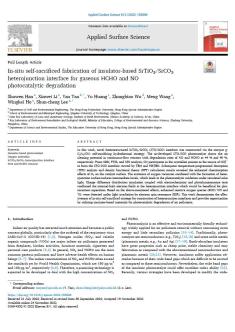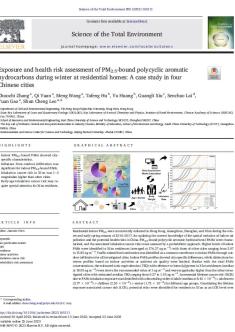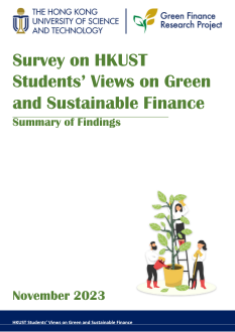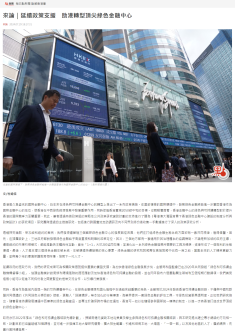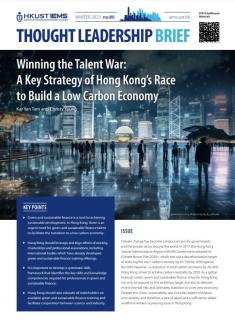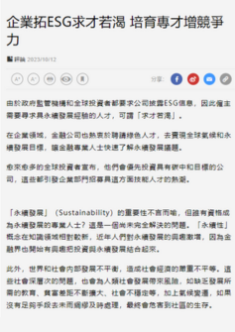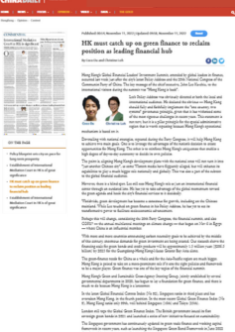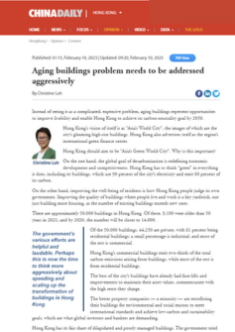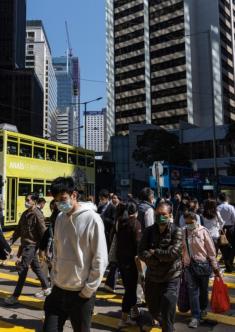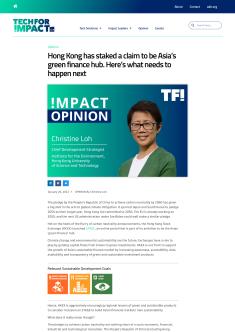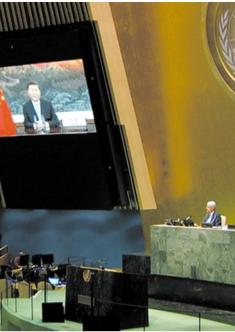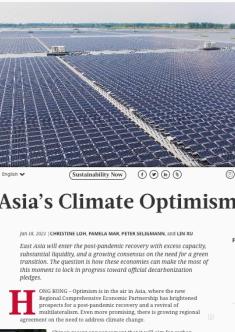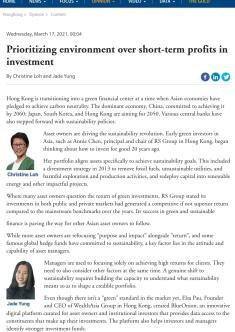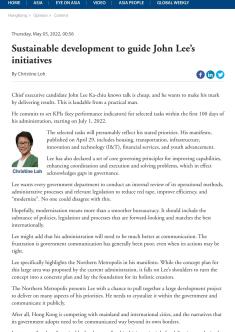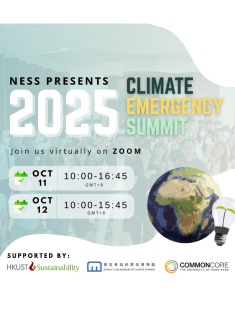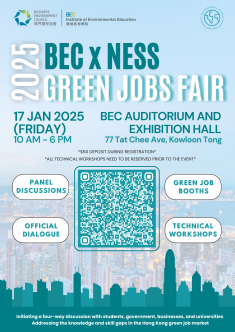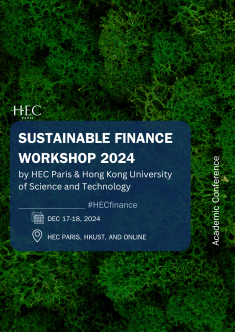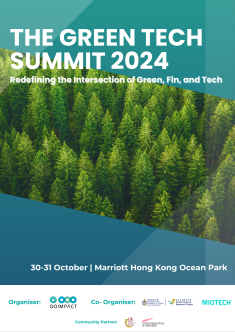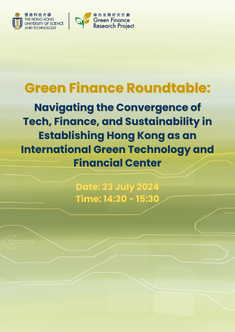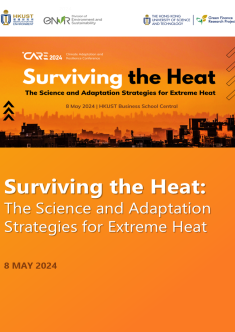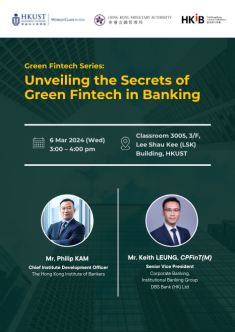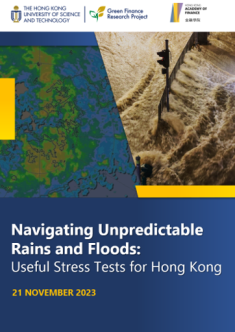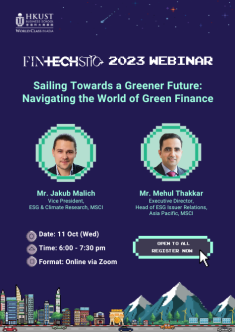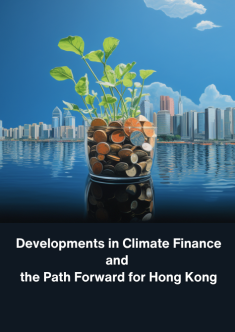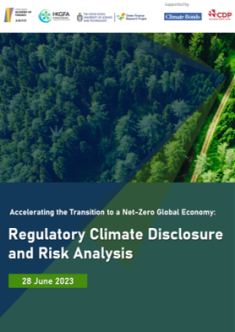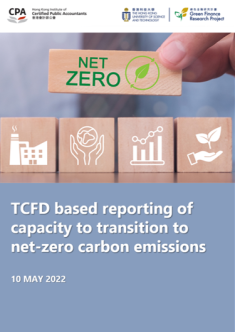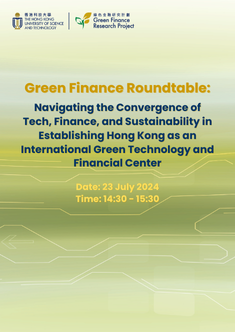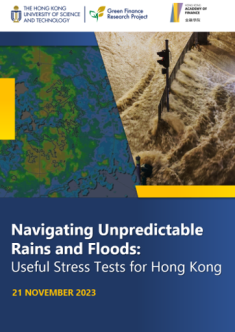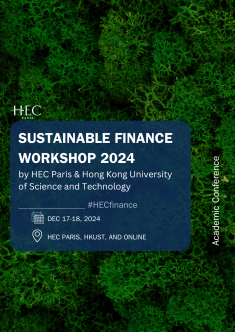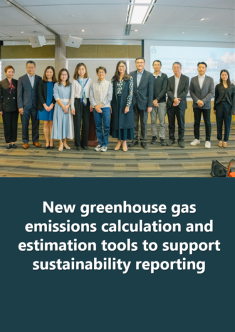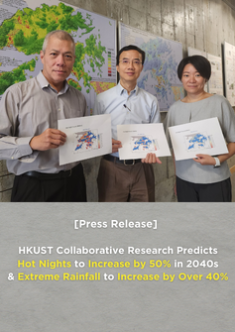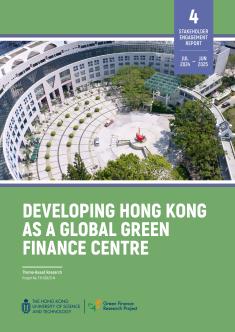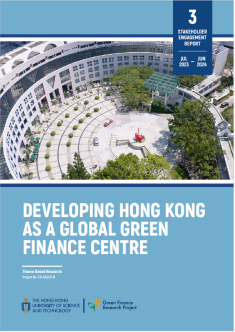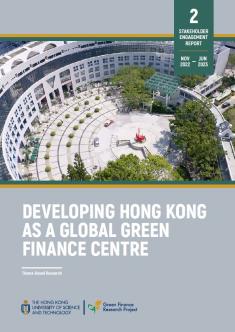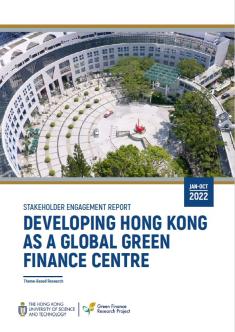Green finance is an interdisciplinary field that requires collaboration to succeed.
The project aims at developing Hong Kong into a leading international green finance center through academic studies and initiatives involving financial markets and services, environment and climate change, public policy, manpower development, and innovation and technology.







The project aims at developing Hong Kong into a leading international green finance center through academic studies and initiatives involving financial markets and services, environment and climate change, public policy, manpower development, and innovation and technology.
Collaboration

Green finance plays a critical role in Hong Kong's efforts to achieve carbon neutrality by 2050. It calls for an interdisciplinary approach to align financial strategies with environmental goals – bringing together financial and environmental expertise and across the public and private sectors. Join us in advocating for green finance in Hong Kong.
Department of Information Systems, Business Statistics and Operations Management

Hong Kong is committed to achieving carbon neutrality by 2050, and we recognize the crucial role of green finance in mitigating environmental risks and facilitating the transition to a net-zero economy.
We have observed a noticeable gap in intellectual progress in the realms of green finance in Hong Kong, and we believe that environmental and financial expertise are equally important in closing this gap. Through interdisciplinary collaboration, we leverage the collective expertise of scholars and practitioners and across sectors to generate new ideas and practical solutions that will propel Hong Kong towards a sustainable and resilient future.
Our project is dedicated to facilitating knowledge exchange and encouraging innovative approaches to green finance. Join us in advocating for green finance in Hong Kong. Stay informed on our research developments and study outcomes and be part of the conversation.

Department of Information Systems, Business Statistics and Operations Management
Climate adaptation involves critical infrastructure that requires capital investment. By leveraging green finance and scaling green solutions, businesses can accelerate the change and significantly impact the environment. Join us in creating societal impacts as we strive to advance Hong Kong's intellectual frontier of green finance.

Climate change is a critical global issue that demands urgent attention. We have heavily relied on fossil fuels for decades and that needs to change. Achieving sustainability requires us to internalize externalities and consider the entire value chain in our analysis. By identifying areas for improvement and incorporating them into our cost-benefit analysis, we can make informed decisions that promote a sustainable future.
Green finance is fundamental to achieving sustainability goals, as businesses have the power to drive societal change and scale up green solutions. Furthermore, climate adaptation requires significant capital investment and financial support for critical infrastructure.
Our project aims at gathering research insights and developing prototypes that advance the intellectual frontier of green finance. Join us as we strive for generating both academic achievements and societal impacts.

Division of Environment and Sustainability
Research Approach
With the 'Think & Do' research approach as our foundation, our project focuses on strategic prioritization, stakeholder engagement, and collaborative action, generating impactful outcomes.
Division of Environment and Sustainability

Our project is built on the unique research approach called 'Think & Do'. It is designed to prioritize key considerations during the thinking phase to gain support from project partners. This involves framing tasks for policy making and effectively communicating with stakeholders, government, media, and the public.
During the doing phase, we identify and work with relevant partners and stakeholders. Through their involvement, we promote collaboration and knowledge exchange, leading to the generation of policy ideas, the development of technology prototypes, and the creation of proof-of-concept financial products.
By embracing the 'Think & Do' research approach, we prioritize strategic thinking, purposeful implementation, and collaborative engagement with stakeholders, amplifying our ability to deliver impactful outcomes.

Division of Environment and Sustainability
Research Approach
We conduct academic research and reflect on policy considerations to gather insights that guide the development of green finance policy, technology and products.
We collaborate with industry partners and government bodies to develop policies, technology prototypes and financial products that advance the intellectual frontier of green finance.

Task 1 comprises four sub-tasks that study different aspects of how environmental risks affect firms' access to financial markets and their financial decisions.
Sub-task 1.1: Assessment of the Efficiency of Different Chinese Equity Markets with Respect to Environmental Information
- Given Hong Kong's reputation as an open and liquid financial market, one potential advantage to listing in Hong Kong could be the presence of a sophisticated investor base – one that understands the value of sustainability and its related regulations and prices pollution and related risks effectively. In this sub-task, we aim at analyzing the efficiency of Hong Kong's financial markets in incorporating new information on pollution into listed firms' stock prices.
- Through our study, we will be able to describe the key efficiency issues of the finance market and its importance for Hong Kong, explain the data collection process and analysis, and provide conclusions on the effect of increased transparency of environmental information on the efficiency of financial markets. We expect the study outcomes will enable investors to become more comfortable in trading stocks exposed to environment-related regulations and can thereby impact liquidity, ultimately attracting more companies to list and trade in Hong Kong.
Sub-task 1.2: Climate Risk and its Impact on Firm Performance
- Currently, knowledge on how environmental and climate risks affect firm performance and adaptation is limited. In this sub-task, we focus on measuring the magnitude of the environmental risks of Hong Kong's listed companies and exploring mitigation strategies for the potential damages caused by these risks. We expect to generate a large dataset of great retention value that we will make available to the public. We also expect research outcomes that will lead to effective strategies by firms in dealing with climate and environmental risks.
Sub-task 1.3: Environmental Risk in Firm Investment Decision: Evidence through M&A
- Despite the importance of environmental risks, whether and how firms consider these risks in their investment decisions remains under-explored. Our research in this sub-task will provide insights into how acquirers' familiarity with targets' environmental risks affects M&A likelihood and quality and broadens the applicability of the theory of mergers. Our findings will benefit the industry, especially firms that are involved in M&As, by showing that they can reduce the likelihood of negative investment outcomes if they become familiar with the environmental risk of their investments, and how investors can be informed by environmental risk disclosure, thus making our results valuable to regulators on ESG risk disclosure requirements.
Sub-task 1.4: Measuring the Benefits of Green Bonds
- The issuance of green bonds has rapidly increased in volume over the past decade against the backdrop of the rising demand for green finance products. We see a need to estimate the potential economic and environmental values that can be created by the growth of the green bond market. Thus, this sub-task aims at providing a guideline and incentive for policymakers to promote the further growth of the green bond market. We target to provide the estimated total financial gains of green bond issuance in Hong Kong, possibly with a further breakdown by industry and projection for the years in the future, and policy alternatives and recommendations that incentivize the growth of the green bond market.
| Task 1 Leader | Prof. Chu ZHANG, Department of Finance, HKUST | |
| Co-Principal Investigator | Prof. Abhiroop MUKHERJEE, Department of Finance, HKUST | |
| Co-Principal Investigator | Prof. Allen HUANG, Department of Accounting, HKUST | |
| Co-Principal Investigator | Prof. Darwin CHOI, Department of Finance, HKUST | |
| Co-Principal Investigator | Prof. Guojun HE, School of Business, HKU | |
| Co-Principal Investigator | Prof. Yingying LI, Department of Finance & Department of Information Systems, Business Statistics & Operations Management, HKUST | |
| Co-Principal Investigator | Prof. Yoshio NOZAWA, Rotman School of Management, University of Toronto | |
| Co-Investigator | Prof. Entela BENZ-SALIASI, Department of Finance, HKUST | |
| Co-Investigator | Prof. Kai LI, HSBC School of Business, PHBS | |
| Co-Investigator | Prof. Weikai LI, Lee Kong Chian School of Business, SMU |
Task 2 consists of two sub-tasks that focus on environmental risk management. In the first sub-task, we create climate risk models specially designed for Hong Kong. The insights gathered from these models will be utilized in the second sub-task to develop the pricing strategy for 'basket weather derivatives' to address climate-related risks in Hong Kong and the Mainland.
Sub-task 2.1: Climate Risk Modeling: Future Projection of Temperature and Precipitation Extremes in Hong Kong
- The Paris Agreement established a goal to limit global warming to below 2°C. While this target encourages global action, it does not take into account location variations. In light of this, it is essential for us to assess the risks of climate change in Hong Kong using projections specially tailored to its local conditions.
- Hong Kong, being a subtropical region, has been experiencing heavier rains and dangerous levels of thermal discomfort in recent years. In this sub-task, we will develop Hong Kong-relevant climate projections at different levels of global warming, providing scientific evidence to support climate mitigation policy.
Sub-task 2.2: Designing and Pricing 'Basket Weather Derivatives' to Address Climate-related Risks in Hong Kong and the Mainland
- Weather derivatives have gained popularity for transferring climate risks among market participants. However, existing markets have limitations. They often focus on a single weather variable, such as temperature, rather than considering the combined effects of multiple factors. Moreover, these derivatives primarily cover developed countries, overlooking some important regions.
- This sub-task makes use of the climate model parameters generated in sub-task 2.1, as well as data from agencies and macroeconomic data, to model the joint dynamics of weather indices and consider the pricing of 'basket weather derivatives'. The pricing models will be applied to local settings to design basket weather derivatives for Hong Kong and the Mainland.
| Task 2 Leader | Prof. Jimmy FUNG, Division of Environment and Sustainability & Department of Mathematics, HKUST | |
| Co-Principal Investigator | Prof. Chu ZHANG, Department of Finance, HKUST | |
| Co-Principal Investigator | Prof. Eun-Soon IM, Division of Environment and Sustainability & Department of Civil and Environmental Engineering, HKUST | |
| Co-Principal Investigator | Prof. George PANAYOTOV, Department of Finance, HKUST | |
| Co-Principal Investigator | Prof. Zhanhui CHEN, Department of Finance, HKUST | |
| Co-Investigator | Prof. Xiaoming SHI, Division of Environment and Sustainability, HKUST |
As governments commit to reaching carbon neutrality, we anticipate a significant regulatory shift and a growing demand for carbon reduction technologies in the foreseeable future. According to the data from the Electrical and Mechanical Services Department (EMSD), buildings in Hong Kong consume 90% of the city's electricity and contribute around 70% of its carbon emissions. Commercial buildings, in particular, account for 70% of total energy usage.
Moreover, air pollution is the world's largest single environmental risk. Solutions that simultaneously save energy in buildings and improve indoor air quality would make significant contributions to decarbonization and public health. Therefore, it is important to incentivize owners of existing commercial buildings to retrofit or upgrade their building management systems for better energy performance.
In this task, we seek to align the interests of building owners and users. We work with collaborators to show that building retrofits can improve indoor air quality and save energy at a comparable cost. The work will serve as a foundation to develop a green finance model for building owners to finance similar retrofits. A digital twin system of the retrofitted building will also be developed, serving as a prototype for future research and development.
| Task 3 Leader | Prof. Alexis LAU, Division of Environment and Sustainability & Department of Civil and Environmental Engineering, HKUST | |
| Co-Principal Investigator | Prof. Chu ZHANG, Department of Finance, HKUST | |
| Co-Principal Investigator | Prof. Alminas ZALDOKAS, Department of Finance, HKUST | |
| Co-Principal Investigator | Prof. Jack CHENG, Department of Civil and Environmental Engineering, HKUST | |
| Co-Principal Investigator | Prof. Jimmy FUNG, Division of Environment and Sustainability & Department of Mathematics, HKUST | |
| Co-Investigator | Prof. Shun Cheng LEE, Department of Civil and Environmental Engineering, PolyU | |
| Co-Investigator | Prof. Meng WANG, Department of Civil and Environmental Engineering, PolyU |
Task 4 includes two sub-tasks and aims to study two enabling technologies that contribute to the development of green finance policies and products: a carbon footprint tracking system and a platform that tracks climate risks and impact cases.
Sub-task 4.1: Blockchain-based Tagging of Carbon Footprints along the Supply Chain
- Carbon pricing is an important mechanism for mitigating climate change, but its implementation presents challenges. While some jurisdictions have imposed carbon taxes on fossil fuel or electricity, taxation remains controversial as it has a widespread impact on all businesses, including those not heavily involved in carbon production. Without a robust and credible tracking system, it is difficult to charge consumers at the point of sale based on their carbon footprint or facilitate businesses to account for their shares of carbon production. To address this, we are establishing a blockchain-based carbon footprint tracking system to record and track carbon footprints throughout the supply chain in this sub-task.
Sub-task 4.2: Climate Risks and Impact Tracking
- Climate risks can be categorized based on their complexity and impact. Primary risks directly relate to changes in the physical system, such as temperature, rainfall, and sea level. Secondary risks involve cascading effects on various systems, such as biological, health, and socio-economic systems. Tertiary risks, on the other hand, result from complex interactions across multiple systems, making them difficult to identify and address.
- Establishing resilience against tertiary risks presents a significant challenge due to their complex interactions and multidisciplinary nature. To enhance our ability to address tertiary risks, we will leverage advanced information-gathering capabilities to monitor tertiary impacts worldwide, assess their likelihood of affecting Hong Kong and the Mainland, and provide advice to enhance the preparedness of the government and businesses for tertiary climate change risks.
As Mainland China and Hong Kong have enacted their schedules of decarbonization, a surging number of green investments and products will emerge in the foreseeable future. This presents an opportunity for Hong Kong to establish a comprehensive government policy that fosters talent development, recruitment, and retention in green finance.
This task consists of two research tracks: manpower and policy. The manpower track focuses on the supply and demand of green finance professionals, while the policy track focuses on policy analysis and recommendations associated with green finance. Alongside reports and seminars, best practices in talent recruitment and development will be documented to enrich future teaching and training materials.
The success of developing Hong Kong into a green finance center will require the collaborative strength of a range of internal and external stakeholders. This task is composed of two distinct components: Task 6(a) focuses on policy research with the goal of developing effective governance and policies that will transform Hong Kong into a strong international green finance center, and Task 6(b) identifies key stakeholders and develops strategic communication plans to engage them effectively.
Task 6(a) involves studying the governance systems and decision-making processes in Hong Kong and other regions to identify gaps and understand their impact on the development of green finance. We actively collaborate with policymakers and industry leaders to design appropriate policies and develop the necessary infrastructure to support policymaking and implementation in Hong Kong.
Task 6(b) is dedicated to stakeholder engagement, which is designed to foster a collaborative environment conducive to co-creating ideas, prototypes, and deliverables. Members of Task 6(b) work closely with those involved in other tasks to coordinate stakeholder engagement for maximum network exposure and efficiency.
An integral part of our work in Task 6 includes producing scholarly and popular articles and reports. These not only inform policy development but also enrich research and dialogue among stakeholders, as well as facilitating the transfer of knowledge for future advancements in the field.
| Thrust of Carbon Neutrality and Climate Change, HKUST(GZ) | Prof. Ye QI, Carbon Neutrality and Climate Change Thrust, HKUST(GZ) | |
| Task 6(b) Leader | Prof. Christine LOH, Division of Environment and Sustainability, HKUST | |
| Co-Principal Investigator | Prof. Albert PARK, Department of Economics, HKUST | |
| Co-Principal Investigator | Prof. Kar Yan TAM, Department of Information Systems, Business Statistics and Operations Management, HKUST | |
| Co-Principal Investigator | Prof. Keith CHAN, Division of Environment and Sustainability, HKUST | |
| Co-Investigator | Prof. Coco DU, Thrust of Carbon Neutrality and Climate Change, HKUST(GZ) | |
| Co-Investigator | Prof. Entela BENZ-SALIASI, Department of Finance, HKUST | |
| Co-Investigator | Prof. Ka-Keung CHAN, Department of Finance, HKUST |
Task Leaders' Messages

We are setting the stage for how the financial world can thrive amidst the challenges posed by environmental risks. Task 1 addresses these issues by studying the impact of climate risk on firm performance and how environmental considerations factor into investment decisions, including mergers and acquisitions. Furthermore, we are evaluating the potential value creation driven by the expansion of the green bond market. Through these sub-tasks, we aim to empower investors and policymakers with the knowledge to transform environmental risk into market opportunities, setting a course for sustainable financial success.

Task 2 is at the forefront of climate risk management in Hong Kong. Through climate projections tailored for our city, we are forging the policies of tomorrow. Our groundbreaking 'basket weather derivatives' leveraging multiple weather indices, are driving the progress of weather derivatives markets in the region. These climate projections and predictions are important tools for green finance, guiding investments towards solutions that mitigate and adapt to anticipated climate changes. Together, we are shaping a climate-resilient Hong Kong for generations to come.

We are leveraging technology to create impactful solutions. In task 4, we are developing a prototype system to accurately track carbon emissions along the key supply chains of the building and construction sectors. This endeavor is crucial for refining carbon accounting and developing effective incentives or penalties to encourage carbon reduction. Moreover, the rise in extreme weather events unveils new, unforeseen tertiary risks that could lead to significant financial losses and damage for both the public and private sectors. In response, We're using artificial intelligence (AI) to allow more timely identification of emerging climate risks, thereby aiding public and private entities in adapting and fortifying themselves against these evolving threats. Our vision is to use technology not merely for monitoring but also to forge a path toward a more resilient and sustainable future.

Division of Environment and Sustainability

Hong Kong has the potential to become a leader in green finance. Yet, a challenge remains: there is a clear gap in green finance expertise. Task 5 is designed to bridge this gap by mapping the supply and demand for green finance professionals and understanding how talent moves across the industry. By aligning our efforts with government policies and industry needs, we are actively contributing to establishing Hong Kong as the green finance powerhouse of the future.

Department of Information Systems, Business Statistics and Operations Management

Policy serves as the cornerstone that brings Hong Kong's position in green finance up to its standing as an international finance center. In Task 6(a), we have a clear focus in identifying the necessary governance structures and policy systems and formulating actionable roadmaps for Hong Kong's transformation into an innovative green finance hub. We are dedicated to delivering policy recommendations that are both strategic and actionable, steering Hong Kong to a leadership role in green finance.

Thrust of Carbon Neutrality and Climate Change
HKUST(GZ)

As our project brings together a diverse team of scholars and experts from various fields, we have established a stakeholder engagement process that builds trust and fosters transparency. Through stakeholder mapping, we connect with key individuals and actively incorporate their insights, support, and feedback into our work. This process ensures that we address the full range of stakeholder perspectives and concerns, leading to outcomes that serve our stakeholders and the wider community and laying the groundwork for future cross-disciplinary research.

Division of Environment and Sustainability





